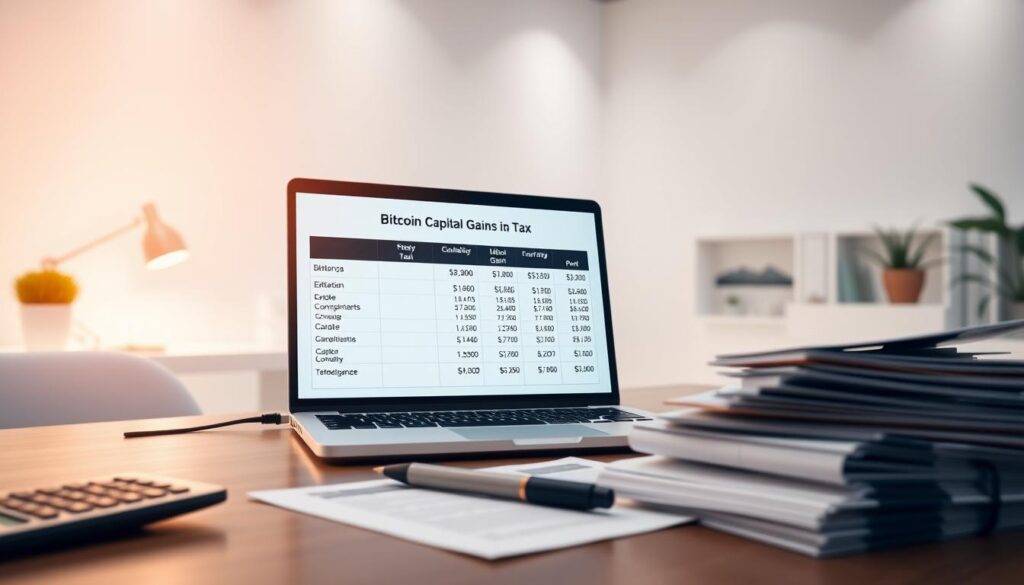The IRS views Bitcoin and other cryptocurrencies as property for tax purposes. This means every Bitcoin transaction, from buying coffee to trading coins, could have tax implications. It’s important to understand Bitcoin tax obligations to avoid penalties and stay compliant with cryptocurrency taxes.
Cryptocurrency taxes apply to U.S. residents, even if transactions happen globally. The IRS requires reporting profits or losses when Bitcoin is sold, traded, or used to pay for goods. Ignoring these rules can lead to audits, fines, or legal action. This guide will help you navigate Bitcoin tax obligations step by step.
Key Takeaways
- Bitcoin is classified as property by the IRS, creating tax responsibilities for every transaction.
- Selling, trading, or spending Bitcoin triggers taxable events requiring documentation.
- Failure to report crypto profits may lead to IRS audits or financial penalties.
- Cryptocurrency taxes apply to all U.S. taxpayers, including those using foreign exchanges.
- Proper recordkeeping and tax forms are essential for compliance with Bitcoin tax obligations.
Understanding the Basics of Cryptocurrency Taxation
Bitcoin and other cryptocurrencies are under strict IRS rules. These rules make holders track their transactions and report gains or losses. The IRS sees Bitcoin as property, not currency, which affects tax rules for every deal.
How the IRS Classifies Bitcoin
Since 2014, the IRS has treated Bitcoin as property for tax purposes. This means any sale, trade, or exchange of Bitcoin triggers capital gains tax. Unlike regular currency, these transactions need detailed records to report cost basis and value changes.
Key Tax Principles for Virtual Currency
- Realization Events: Taxes apply when Bitcoin is sold, traded, or used to buy goods/services.
- Cost Basis Tracking
- Fair Market Value
: Calculate gains using first-in, first-out (FIFO) or specific identification methods.
: All transactions must be reported in U.S. dollars at the time of the event.
The Evolution of Cryptocurrency Tax Regulations
IRS Notice 2014-21 set the stage for virtual currency tax rules. Recent updates cover DeFi, NFTs, and crypto lending. To comply, it’s crucial to stay updated as regulations grow to include new crypto activities.
Bitcoin Tax Obligations for US Taxpayers
All US taxpayers must report Bitcoin and other cryptocurrency activities on tax forms. The IRS treats cryptocurrency as property, requiring disclosure of gains or losses from transactions. Failure to report can lead to penalties even for small trades. Here’s what you must know:
- Reportable events: Selling Bitcoin for cash, trading it for goods/services, or exchanging it for other cryptocurrencies triggers Bitcoin tax obligations.
- Form requirements: Report profits on cryptocurrency taxes via Schedule D (capital gains) or Form 8949. Include total crypto transactions on Form 1040 under Question 7.
- Penalties for non-compliance: Fines can reach 75% of owed taxes. The IRS audits cases using crypto exchanges’ reporting data.
Many assume crypto anonymity hides transactions, but exchanges report user data to tax authorities. Even minor trades—like buying $500 in Bitcoin—must be tracked. Keep detailed records of purchase dates, prices, and transaction IDs to calculate accurate gains or losses. Ignoring these Bitcoin tax obligations risks legal action, even for casual investors.
Compliance protects against audits. Use tracking tools or consult tax professionals to ensure forms match your crypto portfolio’s activity. The IRS prioritizes transparency, treating crypto like any taxable asset.
Taxable Events When Using Bitcoin
It’s important to know when using Bitcoin can lead to taxes. The IRS sees many actions as income, affecting how you reporting bitcoin income. Let’s look at key situations that need your attention.

- Selling Bitcoin for Cash: When you swap Bitcoin for USD, you face capital gains tax. The profit or loss is based on the difference between what you paid and sold for. This rule applies to all sales, no matter the amount.
- Trading Cryptocurrencies: Trading Bitcoin for another coin is also taxable. The value at the time of trade decides if you made a gain or loss. This is part of the tax implications of bitcoin transactions.
- Purchasing Goods/Services: Even buying something small with Bitcoin is taxable. The IRS sees the Bitcoin’s value at the time of purchase as income. You must reporting bitcoin income based on its value increase.
- Bitcoin Mining: Miners have special rules. Rewards are taxed as regular income at the Bitcoin’s value when received. You might get deductions for equipment costs, but you must track every transaction. For more details, check the IRS guidelines on mining.
Every event requires keeping detailed records. Missing small transactions can cause big problems. Stay up to date with tax laws to avoid issues.
Non-Taxable Bitcoin Scenarios
Knowing which Bitcoin activities don’t need tax reporting can make things easier. While many crypto deals lead to tax duties, some don’t. Understanding these exceptions helps avoid unnecessary stress and over-reporting.
Buying and Holding Bitcoin
Buying Bitcoin and keeping it for a long time doesn’t trigger taxes. The IRS sees this as buying an asset, not earning income. Taxes come into play only when you sell or trade it. Keep your purchase records to figure out gains later, but no yearly reports are needed while holding.
Transferring Bitcoin Between Your Own Wallets
Switching Bitcoin between your own wallets, like from a hardware device to a mobile app, isn’t taxable. The IRS views it like moving money between bank accounts. Still, keeping detailed records of all transfers is key to follow Bitcoin tax rules if you have future transactions.
Donating Bitcoin to Qualified Charities
Donating Bitcoin to IRS-recognized 501(c)(3) charities can lead to tax deductions. You need to document the donation date, amount, and charity name. The donation isn’t taxable income for the charity or you. Check the virtual currency tax rules to see if you qualify and for deduction limits.
Capital Gains vs. Ordinary Income for Bitcoin Transactions
Bitcoin profits are taxed differently. The IRS divides them into two types: bitcoin capital gains tax and ordinary income. This distinction changes how much you pay and which tax forms you need.
- Capital Gains Tax: This tax applies to profits from selling Bitcoin as investments. For instance, selling Bitcoin bought for $10,000 at $20,000 results in a $10,000 gain. Gains from long-term investments (held over 1 year) have lower rates than short-term ones.
- Ordinary Income Tax: This tax applies to Bitcoin earned or received. Mining rewards, staking payouts, or getting paid in Bitcoin for work are all taxable income. They are reported at their fair market value on the date received as reporting bitcoin income on tax forms.
Mining income is taxed right away, like regular income. On the other hand, selling investments uses capital gains rules. Mixing these can lead to mistakes. Keep detailed records of purchase dates, costs, and how you earned your Bitcoin to avoid underreporting.
For example, a developer paid in Bitcoin for services must report its value as income. Selling inherited Bitcoin? That’s a capital gain based on its inherited value, not the original cost. Always track how you got your Bitcoin to apply the right tax treatment.
How to Calculate Your Bitcoin Tax Liability
Understanding bitcoin capital gains tax starts with knowing how to figure out your tax. The IRS sees virtual currencies as property. This means you need to track all your buys, sells, and trades carefully. Here’s how to do it step by step.
First, find your cost basis using IRS-approved ways. You can pick from cryptocurrency taxes methods like FIFO, LIFO, or specific identification. Each method changes how you calculate taxable gains:
- FIFO: Uses the cost of earliest acquired coins
- LIFO: Applies costs of most recently acquired coins
- Specific Identification: Explicitly selects which coins to track

Then, decide if your gains are short-term (held ≤1 year) or long-term (>1 year). Short-term gains are taxed like income (up to 37%). Long-term gains have lower rates (0%, 15%, or 20%).
Bitcoin losses can reduce taxable income by up to $3,000 each year. Use Form 8949 to report losses. But, don’t use the wash sale rule for losses on coins bought recently. Keep track of all transactions with tools like CoinTracking or crypto exchanges’ tax reports for accuracy.
IRS Reporting Requirements for Cryptocurrency
IRS bitcoin regulations now require US taxpayers to report specific cryptocurrency activities annually. The “Did you sell, exchange, receive, or send virtual currency?” question on Form 1040 ensures compliance with crypto tax laws. Failing to answer truthfully risks audits and penalties.
- Disclosure thresholds: Report all crypto transactions exceeding $600 in a single year, including sales, trades, or payments.
- Timing: File Form 8300 for transactions over $10,000 within 15 days of the event.
- Record retention: Keep transaction records for at least six years post-sale, as mandated by IRS guidelines.
The IRS enforces crypto tax compliance through audits and partnerships with exchanges. Operation Hidden Treasure, launched in 2023, targets undeclared crypto profits. Non-compliance can lead to fines up to 75% of owed taxes. Exchanges like Coinbase now report taxpayer details directly to the IRS, increasing transparency.
Stay compliant by tracking every transaction, using crypto tax software, and consulting professionals. Understanding these rules is critical to avoiding legal consequences under evolving IRS bitcoin regulations.
Essential Tax Forms for Bitcoin Holders
Knowing which tax forms apply to your crypto activities is key. Proper reporting bitcoin income and crypto tax compliance depend on your transactions. Missing these forms can lead to penalties or audits.
Form 8949 and Schedule D for Capital Transactions
Use Form 8949 to detail Bitcoin sales, trades, or exchanges. Each transaction must list buy/sell dates, proceeds, and cost basis. Then, transfer this data to Schedule D to calculate capital gains or losses. Not reporting short-term gains here could trigger audits.
Schedule 1 for Mining and Other Ordinary Income
Mining rewards or Bitcoin received as payment count as taxable income. Report these on Schedule 1 (Form 1040) under ordinary income. Include the fair market value of crypto at receipt. This ensures accurate reporting bitcoin income from non-sale activities.
FBAR and FATCA for Foreign-Held Crypto
Crypto stored on foreign exchanges may require FinCEN Form 114 (FBAR) if balances exceed $10,000 annually. Form 8938 (FATCA) applies to foreign crypto assets over IRS thresholds. These forms address offshore holdings to avoid penalties for undisclosed assets.
Recordkeeping Strategies for Bitcoin Transactions
Keeping clear records is key for following cryptocurrency taxes. Good documentation makes reporting easier and lowers audit risks. Here’s how to keep your financial records in order.
What Details to Track
- Date and time of every transaction
- Buying/selling price in USD at the time
- Exchange or wallet identifiers
- Type of activity (trade, mining, gift)
Every trade’s cost basis and fair market value must be recorded. This is to calculate gains or losses for tax filings.
IRS Retention Rules
Keep records for cryptocurrency taxes until the IRS says otherwise. The general rule is to keep documents until the asset is fully disposed of. For active traders, keep records at least 3 years beyond tax filing deadlines.
- Transaction confirmations: Save indefinitely
- Year-end portfolio statements: Keep 7+ years
- Exchange account statements: Retain for 6 years in some cases
Tools to Simplify Tracking
Manual spreadsheets can be error-prone. Automated bitcoin tax software like CoinTracker or Koinly auto-import data from exchanges. These tools calculate cost basis, generate tax forms, and sync with multiple wallets. Using bitcoin tax software ensures accuracy and saves time on organizing receipts and statements.
Bitcoin Tax Software and Professional Services
Managing crypto taxes needs reliable tools. Bitcoin tax software makes tracking easier. It imports data, calculates gains, and fills out IRS forms. This helps those with many trades or holdings.
- Automated transaction imports
- Cost basis tracking
- Form 8949 and Schedule D preparation
Tools like TurboTax connect with crypto platforms. This makes reporting easier. But, you might need to adjust for special cases like airdrops or forks.
Professional services offer help from certified public accountants (CPAs) who know crypto. They help with audits, tax rules, and legal risks. Firms like Marcum or WithumSmith+ brown give personalized advice for those with a lot of assets.
Choosing the right tool depends on how active you are. If you trade a lot or have big taxable events, experts are best. Make sure the software works with all your exchanges and wallets.
It’s important to check your tax filings regularly. Software helps, but you need to watch for special cases. Look for tools with audit trails and IRS form support to meet crypto tax rules.
Common Bitcoin Tax Mistakes and How to Avoid Them
Understanding the tax implications of bitcoin transactions is key to avoiding trouble. Many people miss important details, which can lead to fines. Here are some common mistakes and how to dodge them.
Overlooking Taxable Events
- Don’t forget that swapping one crypto for another is taxable.
- Even small purchases over $20,000 need to be reported. Keep track of all your trades.
Incorrect Cost Basis Calculations
- Stick to one method, like FIFO or LIFO, and document it. The IRS wants proof.
- Include fees from exchanges in your cost basis to avoid paying too much in taxes.
- For rare tokens like SOL or LINK, use the fair market value at the time of trade.
Failing to Report All Exchange Accounts
- Every crypto account, even if it’s not active, must be reported.
- Don’t ignore “small” accounts. The IRS checks Form 1099-BS data against your returns.
To keep up with crypto tax compliance, you need to keep detailed records. Check your past returns against IRS rules and seek help from experts if needed. Being proactive can help you avoid audits and fines.
Tax Planning Strategies for Bitcoin Investors
Smart tax planning can lower your bitcoin capital gains tax and make following Bitcoin tax obligations easier. Start by holding assets for over a year to get lower long-term rates. Also, extend your investment time to reach better tax brackets.

Timing is key. Use tax-loss harvesting to balance gains by selling coins that have lost value. But, don’t buy similar assets within 30 days to avoid penalties. Donating appreciated Bitcoin to charity can also help avoid capital gains while you get deductions. Look into self-directed IRAs for tax-deferred growth, but remember, contributions have limits.
- Hold Bitcoin for >1 year to qualify for lower long-term bitcoin capital gains tax rates
- Harvest losses strategically to offset up to $3,000 in taxable income yearly
- Donate appreciated Bitcoin to qualified charities for tax deductions
Year-end planning is crucial. Finalize trades before December 31 to secure gains or losses. Keep detailed records of all transactions with IRS-approved tools. Always talk to experts to make sure your plans fit current laws. Legal planning helps reduce risks without breaking reporting rules. Focus on being open while saving money through legal ways.
Special Considerations for Bitcoin Miners and Businesses
Bitcoin miners and businesses need to follow IRS bitcoin regulations to avoid trouble. They must report their bitcoin income correctly to meet tax laws. This is especially true for those who work for themselves or run businesses.
Self-Employment Tax Implications
Miners earn money from mining and must pay self-employment tax on it. This tax is 15.3% for Social Security and Medicare. They might need to make quarterly payments to avoid fines.
All Bitcoin mined must be reported on tax forms like Schedule C or Schedule SE.
Business Expense Deductions
Businesses can write off expenses related to crypto, like:
- Electricity for mining rigs
- Equipment maintenance
- Software and subscriptions
- Rental costs for mining facilities
They need to keep invoices and receipts to back up their deductions.
Depreciation of Mining Equipment
Mining gear can be written off over time. Owners can use Section 179 or 5-year MACRS depreciation. This lowers taxable income by spreading costs over the equipment’s life.
Choosing the right business structure, like an LLC or S-corporation, can also cut taxes. Good planning helps follow IRS bitcoin regulations and use deductions wisely.
International Bitcoin Tax Considerations for US Citizens
US citizens and residents face unique challenges with virtual currency tax rules for Bitcoin. The IRS requires reporting all crypto transactions worldwide. This includes foreign exchanges, wallets, or mining activities.
Foreign Bank Account Reports (FBAR) apply to crypto accounts over $10,000 in foreign banks. US taxpayers must also report foreign crypto holdings under FATCA. Not disclosing these assets can lead to penalties.
Foreign tax credits might reduce your liability if you paid taxes in another country. But, you must follow US rules to avoid double taxation.
- Global Reporting: All Bitcoin gains/losses are taxable, no matter where they happen.
- FBAR Compliance: Report foreign crypto accounts over $10,000.
- Tax Treaties: Check agreements between the US and host countries to avoid disputes.
Expatriates and digital nomads need to track exchange rates and transaction dates. This is for accurate cost basis calculations. Cross-border crypto trades or gifts can also trigger taxes. It’s wise to consult a tax professional in cryptocurrency taxes to avoid IRS issues.
Staying Compliant in an Evolving Regulatory Landscape
The IRS bitcoin rules keep changing as digital assets like NFTs and DeFi grow. To stay in line with crypto tax rules, taxpayers need to watch for updates from the IRS, Treasury, and Congress. New trends like staking rewards or unique cryptocurrency models create unclear areas, needing constant research and records.
For help, check out the Fusion Taxes blog. It offers tips on understanding new rules and filling out reports correctly.
To stay on top, use crypto tax software and work with tax experts. If you’ve missed something in the past, you can use voluntary disclosure programs or file amended returns. Keeping detailed records and being ready to adapt will help you meet future IRS bitcoin rules.
It’s important to regularly check your investments, know what’s taxable, and keep up with law changes. This way, investors can handle the changing world of digital assets wisely.
FAQ
What are my Bitcoin tax obligations as a U.S. taxpayer?
As a U.S. taxpayer, you must report Bitcoin transactions on your tax return. This includes any capital gains or losses from selling, trading, or using Bitcoin. The IRS treats Bitcoin like property, so you report it like stocks or real estate.
It’s important to keep detailed records of all your Bitcoin transactions. This ensures you comply with tax laws and report accurately.
How is Bitcoin classified by the IRS?
The IRS sees Bitcoin and other cryptocurrencies as property, not currency. This means selling or exchanging Bitcoin can lead to capital gains or losses. You must report these on your tax return.
What tax forms do I need to file for Bitcoin transactions?
You’ll likely need Form 8949 for capital gains and losses from Bitcoin. Then, use Schedule D to summarize these. If you earn Bitcoin through mining or services, report that income on Schedule 1.
Make sure to check your tax situation to see all the forms you need.
Are there any non-taxable scenarios for Bitcoin?
Yes, some Bitcoin activities are not taxable. Buying and holding Bitcoin doesn’t trigger a taxable event. Transferring Bitcoin between your own wallets is also non-taxable.
Donating Bitcoin to qualified charities can also offer tax benefits. You can deduct the fair market value without recognizing capital gains.
How do capital gains and ordinary income taxes differ for Bitcoin transactions?
Bitcoin profits can be taxed differently. Selling Bitcoin you held for over a year can be taxed at lower rates. But, Bitcoin earned from mining or services is taxed as ordinary income, at higher rates.
How can I calculate my Bitcoin tax liability?
To figure out your Bitcoin tax, start with your cost basis. You can use FIFO or LIFO methods. Also, separate short-term gains (less than a year) from long-term gains (over a year), as tax rates vary.
Remember, Bitcoin losses can offset gains. Keeping accurate records is key for correct calculations.
What are the IRS reporting requirements for cryptocurrency?
The IRS wants you to answer the “virtual currency” question on Form 1040. This determines if you’ve had any cryptocurrency transactions. You might need to report cryptocurrency holdings on FBAR or FATCA forms if applicable.
It’s crucial to stay informed about these requirements. The IRS is cracking down on crypto compliance.
What common mistakes should I avoid regarding Bitcoin tax reporting?
Don’t overlook taxable events like crypto-to-crypto trades. Also, make sure to account for all exchange accounts. Incorrect cost basis calculations and poor record-keeping can cause big problems.
To avoid these mistakes, keep detailed records of all transactions. Also, review IRS guidelines to ensure you’re following the rules.
Is there tax software available to help with Bitcoin reporting?
Yes, there are tax software solutions for cryptocurrency. They help track transactions, calculate gains and losses, and prepare tax returns. These tools can make the process easier, but double-check their accuracy.
In complex cases, it might be wise to get professional tax help.
What should Bitcoin miners know about their tax obligations?
Bitcoin miners face self-employment tax obligations, in addition to regular income tax. You can deduct business expenses like electricity, maintenance, and equipment. Proper documentation and understanding depreciation for mining equipment are also key for tax benefits.


No comments yet